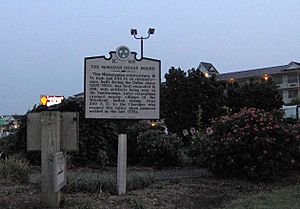Dallas phase facts for kids
The Dallas phase was a time period (from about 1300 to 1600 CE) when a group of people lived in the southern Appalachian Mountains in North America. They were part of the larger Mississippian culture, known for building mounds. This period is studied by archaeologists to understand how these ancient people lived.
Contents
Where Did the Dallas People Live?
The Dallas people moved into what is now southwest Virginia from northeastern Tennessee around the early 1200s. They built their homes along rivers like the Holston River, Nolichucky River, and Little Pigeon Creek in Tennessee. They also lived along the Clinch River in Virginia.
How Did the Dallas People Live?
Dallas settlements often had one to three large platform mounds. These were flat-topped hills built by people, likely for important buildings or ceremonies. Some smaller settlements did not have any mounds.
The Dallas society had different groups of people. There were leaders or important families (sometimes called nobles) and regular people (commoners). This difference was even seen in how they buried their dead. Important people were buried in the mounds, while others were buried elsewhere.
Archaeologists have found many interesting items from the Dallas phase. These include fancy shell gorgets (decorated necklaces made from shells), ear pins, and beads.
The Dallas people built "large log houses." Their towns were planned with a central open area called a plaza. Around this plaza, they built homes for both winter and summer.
Dallas Pottery
The Dallas people made a special kind of pottery called Dallas Ware. They mixed crushed mussel shells into the clay to make it stronger. Their pottery often had special features like lugs (small handles), carved designs, textured strips, and strap handles. Two common styles were Dallas Plain (without decoration) and Dallas Cordmarked (with patterns made by pressing cords into the wet clay).
Important Dallas Sites
Many places where the Dallas people lived have been found by archaeologists. Some of these important sites include:
- Bussell Island (40LD17) in Loudon County, Tennessee
- Chiaha in Jefferson County, Tennessee
- Citico (40HA65) in Chattanooga, Hamilton County, Tennessee
- Cox site (40AN19) in Anderson County, Tennessee
- David Davis Site (40HA301) in Hamilton County, Tennessee
- DeArmond Site (40RE12) in Roane County, Tennessee
- Fain's Island (40JE1) in Jefferson County, Tennessee
- Henderson Site (40SV4) in Sevier County, Tennessee
- Henry Farm Site (40LD53) in Loudon County, Tennessee
- Hiwassee Island Site (40MG31) in Meigs County, Tennessee
- Hixon Site (40HA3) in Hamilton County, Tennessee
- McMahan Mound Site (40SV1) in Sevier County, Tennessee
- Toqua (40MR6) in Monroe County, Tennessee
Some sites linked to the later Overhill Cherokee people, like Citico (40Mr7) and Chilhowee (40Bt7), also have Dallas phase artifacts. However, the Dallas phase itself is believed to be connected to the ancestors of the Muscogee (also known as Creek) peoples.
When Was the Dallas Phase?
The Dallas phase followed an earlier period called the Hiwassee Island phase, which lasted from about 1000 to 1250 CE. The Dallas phase then had two main parts:
- Early Dallas: From about 1250 to 1450 CE.
- Late Dallas: From about 1450 to 1650 CE.
After the Dallas phase, other groups like the Overhill Cherokee and Mouse Creek peoples lived in the region.
 | Emma Amos |
 | Edward Mitchell Bannister |
 | Larry D. Alexander |
 | Ernie Barnes |


